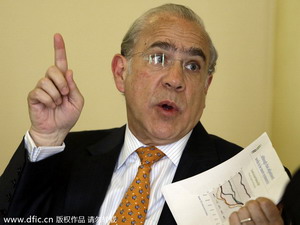Sustainable recovery top priority for 2014: OECD chief
Updated: 2014-01-25 10:29
(Xinhua)
|
|||||||||||
|
 Angel Gurria, secretary general of the Organization for Economic Co-operation and Development (OECD). [Photo / dfic.cn] |
DAVOS - The top policy priority for 2014 is to put the recovery on a sustainable path and to ensure everybody participates, says the secretary general of the Organization for Economic Co-operation and Development (OECD).
"The crisis has left us with four very heavy legacies - slow and uneven growth, persistently high unemployment levels, growing inequalities and record low levels of trust," Angel Gurria, who is in Davos for the annual meeting of the World Economic Forum, said in an email interview with Xinhua.
"These legacies keep weighing down on expectations and business decisions," added the secretary general.
"The other crucial factor is that the four cylinders of global growth - investment, trade, credit and emerging markets dynamism - are all running at half speed," he said.
He called on countries to take actions to achieve a sustainable recovery and move forward from the crisis.
The US Congress must reach a sustainable agreement on its country's debt ceiling, he said, calling the ceiling a Damocles' sword hanging over the world economy.
Kicking the can down the road with another temporary suspension of the debt ceiling was not ideal and did not remove the risks that dented business confidence and dampened investment, he added.
In Europe, financial markets needed to return to a normal state of play, in order to get the credit system going and reinvigorate investment, he said, adding that this required repairing banks' balance sheets and progressing towards a full banking union.
Noting that the structural arrow of the so-called Abenomics was not yet in place in Japan, Gurria proposed that Japan should follow through on its announced agricultural reform, facilitate its participation in regional trade agreements, break down labor market dualism and accelerate regulatory reform.
"This is a major weakness of the current strategy, as quantitative easing alone won't be enough to get the country durably out of deflation," Gurria said.
In addition, he also noted that unemployment remained at very elevated levels in many countries, weighing on world potential economic growth.
"More must be done to put people back to work," he said.
The secretary general said 2014 was also the year to strengthen international cooperation on tax rules and practices. Countries should work together to finally shut down cross-border loopholes for tax evasion and improve compliance.
He said a quick implementation of the new reform package in China would be key to maintaining future growth and avoiding a further progressive slowdown in economic growth.
It would be beneficial not only for China but also for others, as more rapid growth would help provide more business opportunities for the whole world, Gurria said.
"The tasks ahead are not easy, but the benefits to our economies and societies are worth the effort," he concluded.
Related Stories
China's economic reforms resonate with Davos participants 2014-01-24 15:38
Davos important to exchange ideas in time of rapid change 2014-01-24 10:05
Vigor of global capital market in doubt as liquidity falls off 2014-01-24 09:53
Global economy grows on 'two engines': World Bank chief 2014-01-23 15:54
World's political, business leaders gather in Davos for WEF 2014-01-23 15:52
World economy not yet flying on all engines: IMF chief 2014-01-23 11:10
Today's Top News
Abe floats hawkish plan
Sino-US naval hotline urged to tackle conflict
Xi Jinping to lead national security commission
Dec worst air quality month of 2013
FM emphasizes China-WEF cooperation
December worst air quality month
China denounces Abe's remarks
Another bumper year 'possible'
Hot Topics
Lunar probe , China growth forecasts, Emission rules get tougher, China seen through 'colored lens', International board,
Editor's Picks

|

|

|

|

|

|





